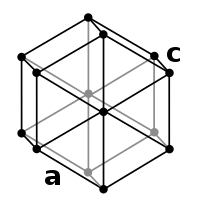
Photo from wikipedia
The challenge in catalytic reactions lies within its complexity coming from high dimensional experimental factors. In order to solve such complexity, machine learning is implemented to treat experimental conditions in… Click to show full abstract
The challenge in catalytic reactions lies within its complexity coming from high dimensional experimental factors. In order to solve such complexity, machine learning is implemented to treat experimental conditions in high dimensions. Oxidative coupling of methane, methane to C2 compounds (ethylene and ethane), is chosen as the prototype reaction where 156 data consisting of various experimental conditions is prepared. Machine learning reveals that the relationship between experimental conditions and C2 yield is non‐linear matter. In particular, extreme tree regression is found to accurately reproduce the experimental data. In addition, machine learning predictions can be a good indicator for designing experiments. Thus, machine learning can be a powerful approach towards understanding and determining experimental conditions in high dimension.
Journal Title: ChemCatChem
Year Published: 2019
Link to full text (if available)
Share on Social Media: Sign Up to like & get
recommendations!